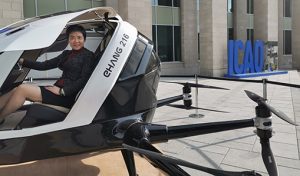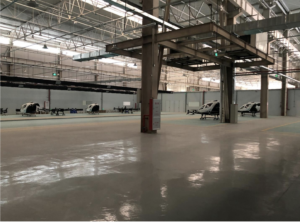Due diligence firm Wolfpack Research issued a short report on Tuesday against Guangzhou-based passenger drone maker EHang (NASDAQ:EH), claiming that substantial portions of the company’s revenues were fabricated.
EHang, founded in 2014 and public since December 2019, was trading at over USD 110 per share on Tuesday morning but the stock rapidly plummeted by more than 60% following the short attack. The decline continued as EHang’s share price dropped by more than 20% in Thursday trading, closing at USD 61.19.
EHang released a statement later on Tuesday refuting the report’s claims, saying that it “contains numerous errors, unsubstantiated statements, and misinterpretation of information”, without offering a timeline for a more detailed rebuttal.
Wolfpack Research alleges that EHang’s relationship with its primary customer, Shanghai Kunxiang Intelligent Technology, is a sham. The report also claims that the company has generated just RMB 25.2 million (USD 3.2 million) in the 14 months since its public offering, compared to a reported RMB 125.5 million (USD 18 million) in total revenues during that period.

An elaborate stock promotion?
Since EHang’s IPO in late 2019, its share price hovered around USD 10 until the turn of the year, when it steadily surged to over 100 USD last week.
The company had experienced an eventful 2020 according to its press team, which culminated in China’s State Post Bureau approving regulatory standards for drone delivery effective from January 1, 2021, after consulting with industry leaders like EHang, JD.com, and ZTO.
In May 2020 EHang received approval from the Civil Aviation Administration of China (CAAC) to conduct air logistics operations with heavy loads weighing up to 150 kilograms.
The firm also signed agreements to conduct unmanned aerial flights in countries like South Korea and Canada, while also opening a new production facility in Yunfu, Guangdong where EHang will also debut its unmanned firefighting service.
However, Wolfpack Research investigated the company’s manufacturing facilities in Yunfu and found no evidence of advanced manufacturing materials or semblance of production operations.
While the company’s business has yet to reach a mature scale—it delivered just 23 drones in the third quarter of 2020—the report shows that the facility in Yunfu has not begun production as the firm has claimed.
Encouragement to Wall Street skeptics
While Wolfpack Research’s report has not prompted confirmation of revenue fabrications to the same devastating effect as with Luckin Coffee, EHang’s stock dive signals that some investors remain wary of Chinese companies and emphasized the legitimacy of the report’s findings.

Last year, in addition to a joint report with Muddy Waters against Luckin Coffee, Wolfpack Research also released short reports on Chinese companies including Baidu-owned streaming platform iQiyi, and news portal Qutoutiao, but both were able to emerge relatively unscathed.
Other Chinese firms have been targeted by short-sellers in the US, with reports published alleging fraud at livestreaming company Joyy Inc. and edtech firm GSX Techedu.
The short report on EHang comes just weeks after European asset management firm Carmignac invested USD 40 million in the company.
Meanwhile, San Francisco-based competitor Joby Aviation, which is backed by investors including Toyota and Intel, expects its aircraft to be certified by 2023 and begin commercial operations in 2024, seven years after the firm’s first prototype took to the skies.
